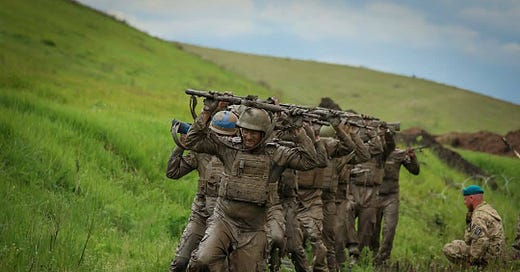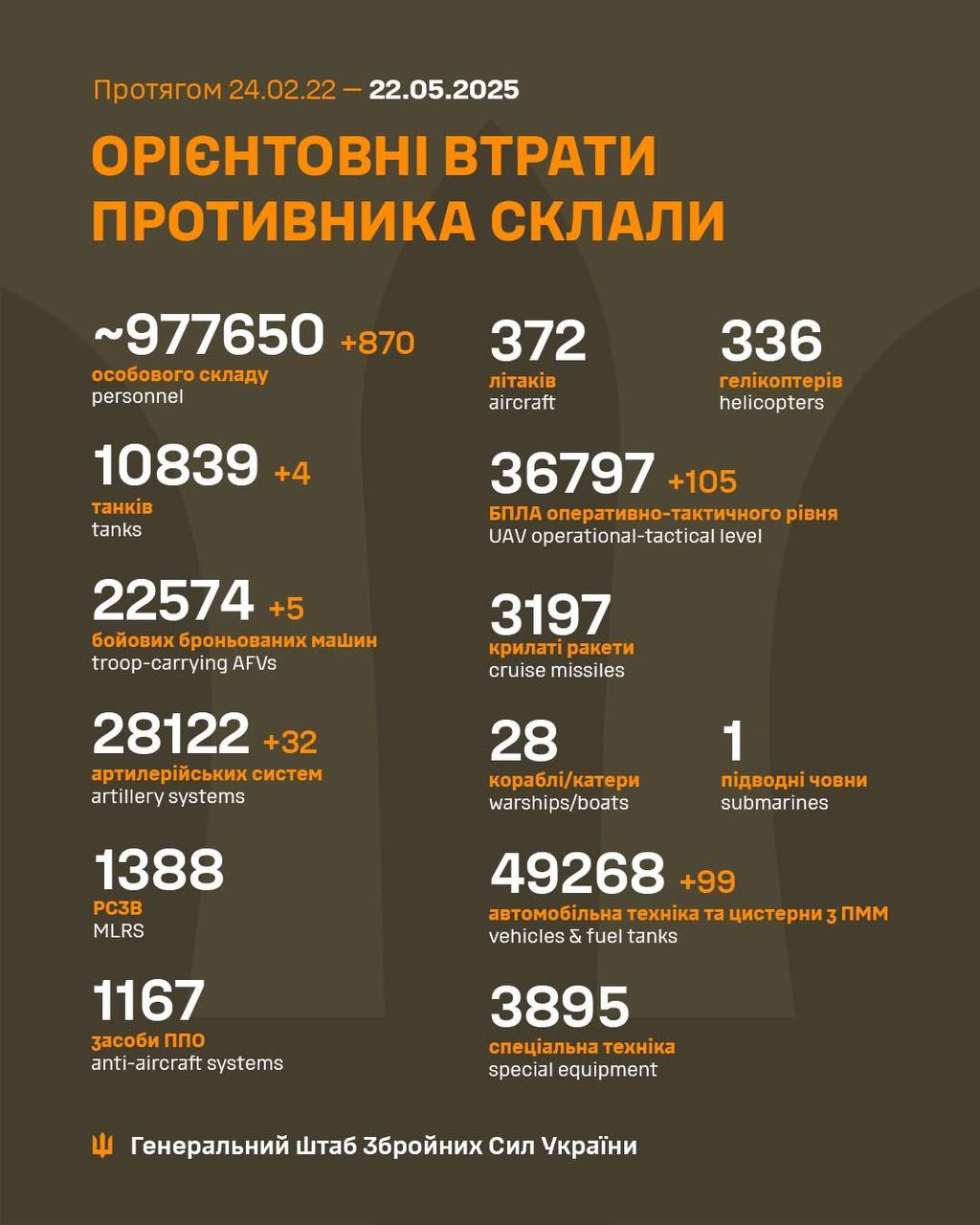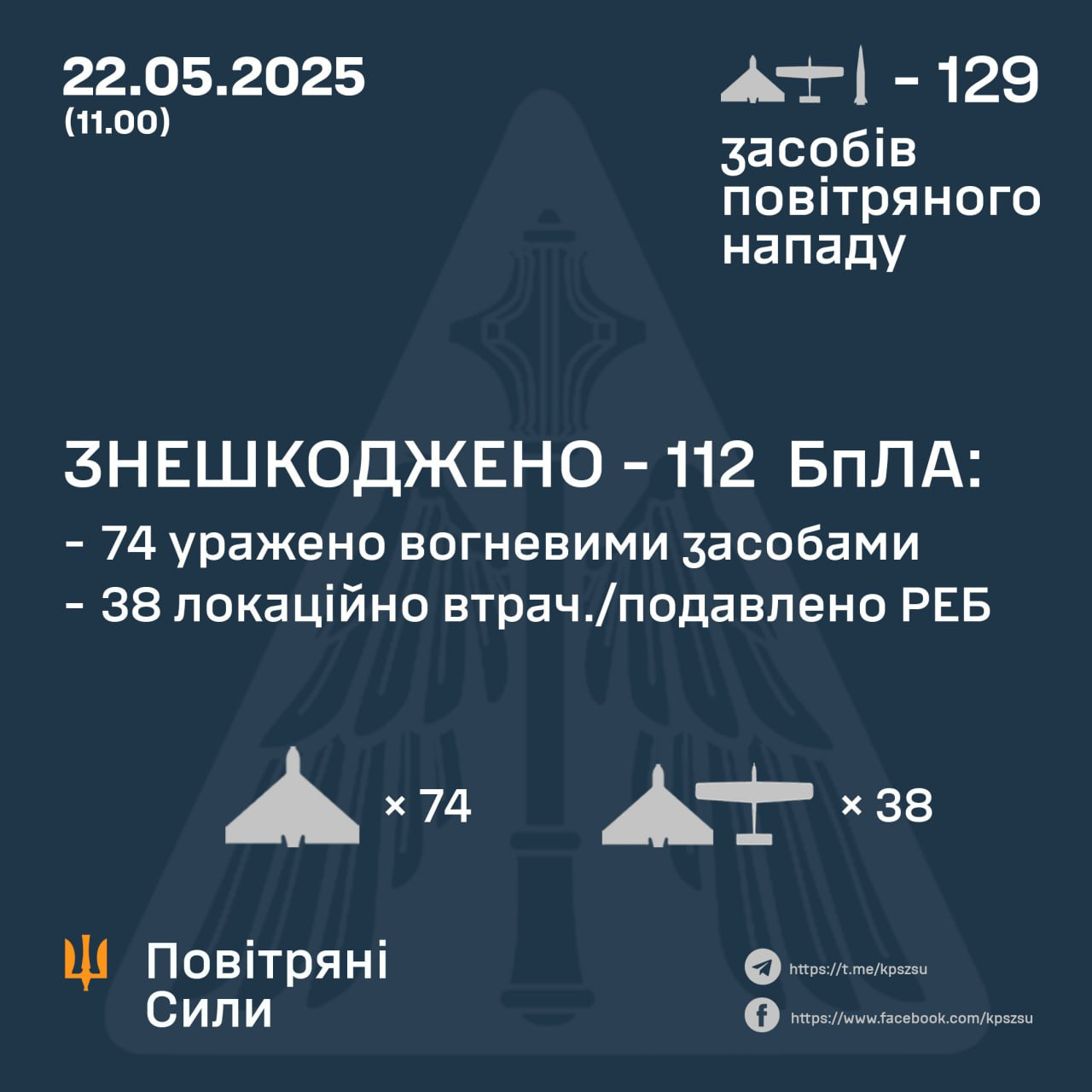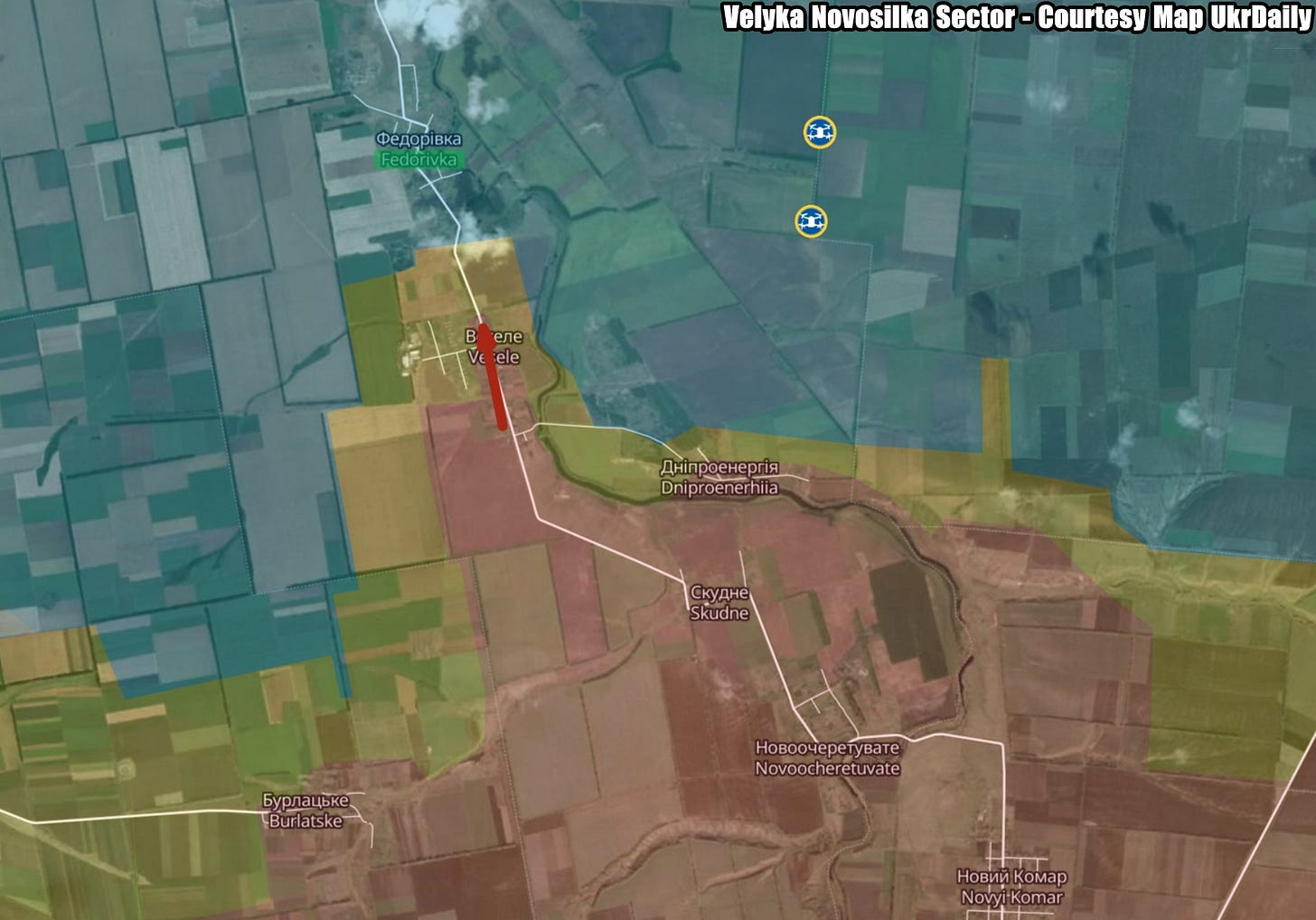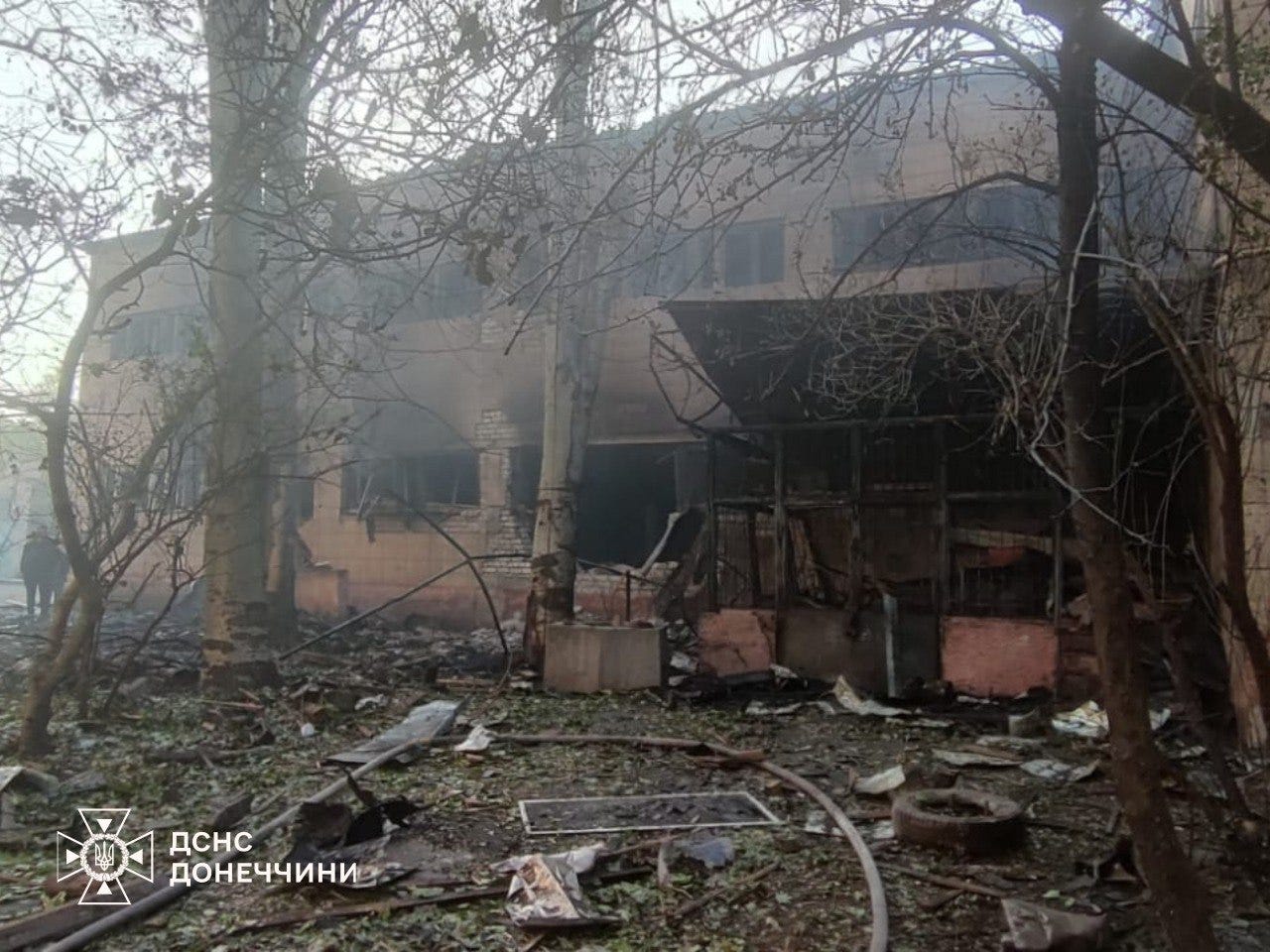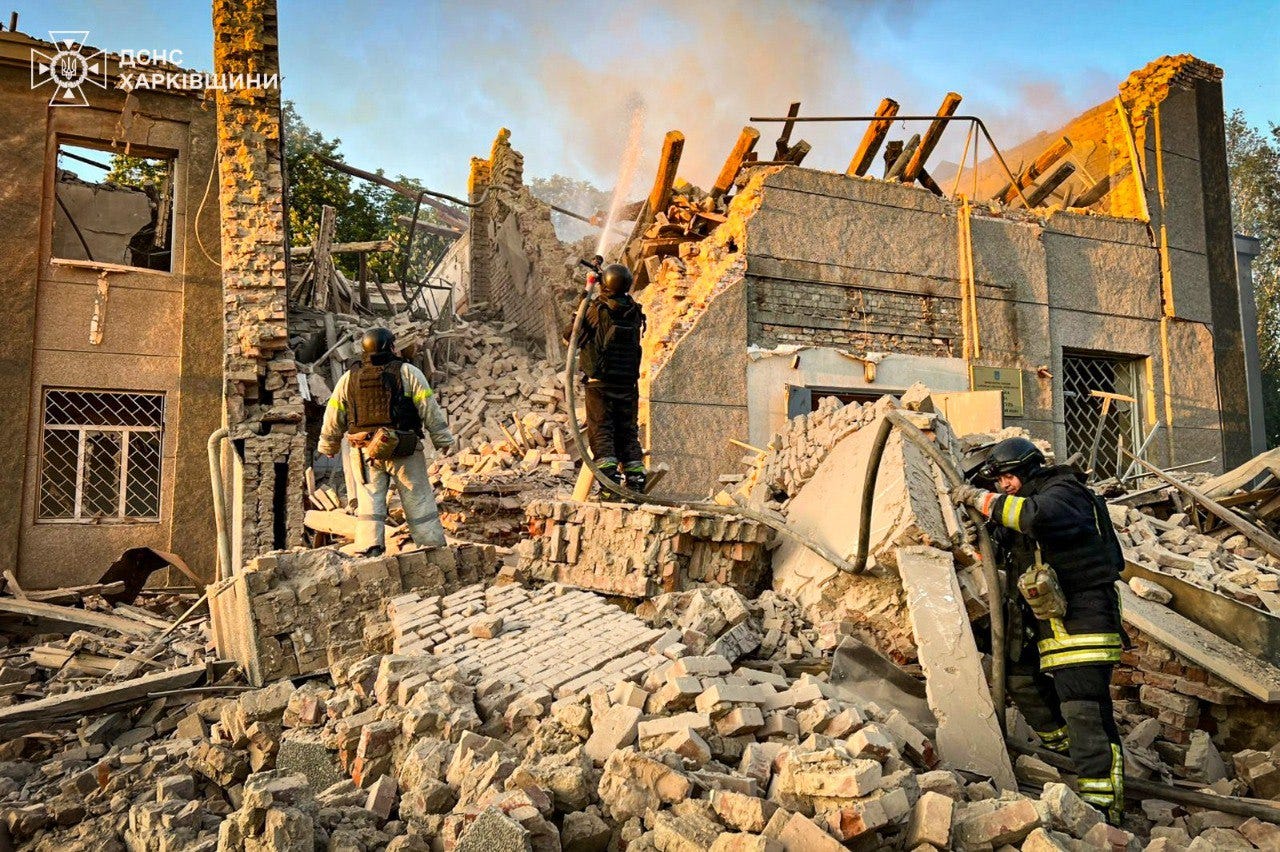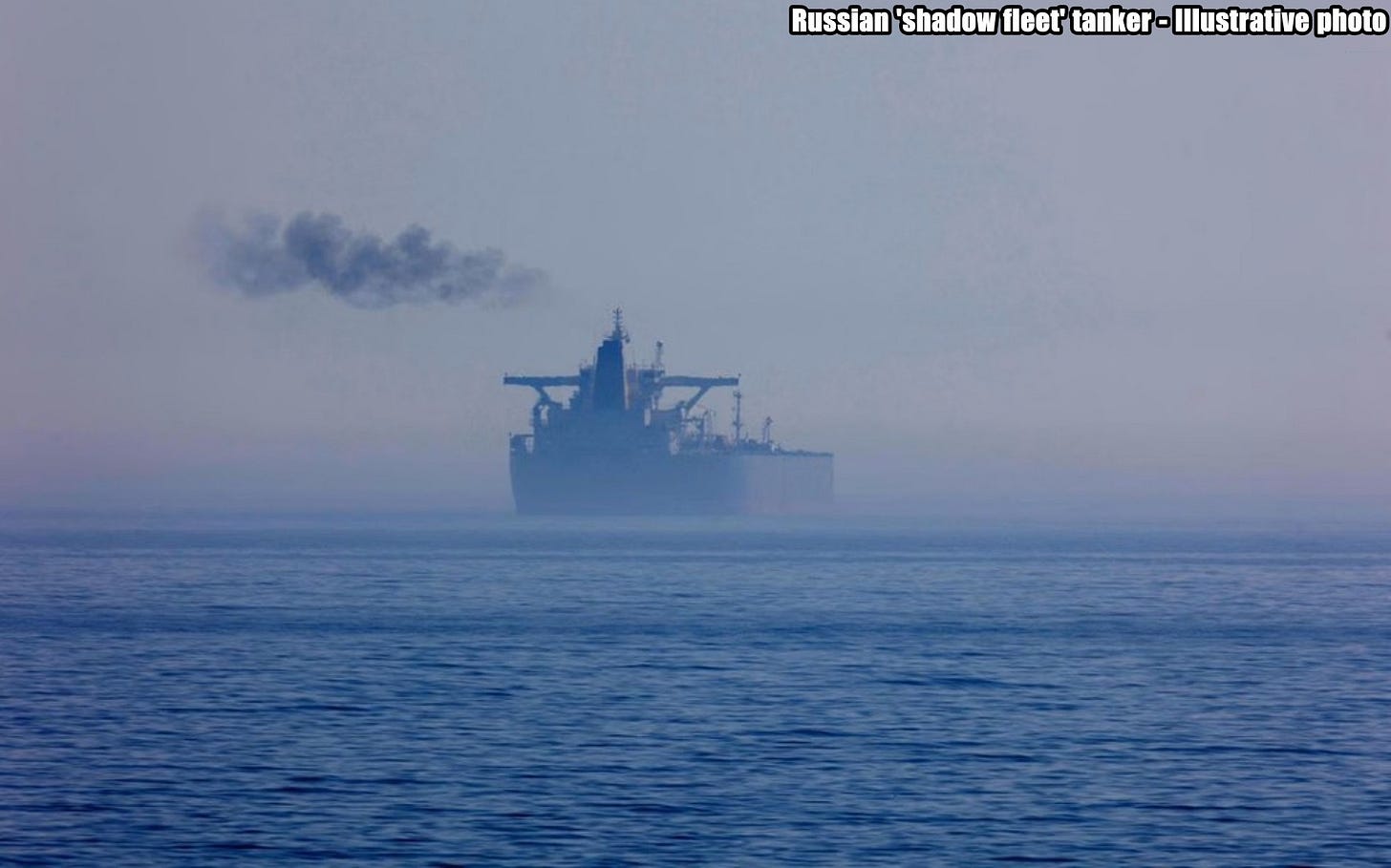Slava Ukraini! In early 2022 I began a Telegram channel aggregating news from a number of sources daily on the war in Ukraine. In June 2023 I began providing a daily draft for the Ukraine War Brief Podcast collecting news from over 70 sources daily, which formed the basis of the script. While the Podcast no longer exists I have continued to make this Brief available for my followers here on Substack for those who wish to keep up with the news from the war.
If you find the Brief informative I would appreciate it if you shared it with others.
All the latest news on the Russo-Ukraine War 6 days per week
ALONG THE CONTACT LINE
GSAFU Morning Report
For: May 22,2025
The General Staff of the Armed Forces of Ukraine in its Operational Information update at 08:00 on May 22 stated that day 1184 of the full-scale invasion of the Russian Federation against Ukraine had begun.
The situation on the line of combat remains tense in some sectors. Ukrainian defenders continue to actively counteract the Russian aggressor, causing them significant losses in personnel, equipment and technology. Exhausting the enemy along the entire front line and continuing to disrupt the plans of Russian occupiers to advance deeper into the territory of Ukraine.
During the past day, 144 combat engagements took place.
Over the past 24 hours, the enemy carried out 90 air strikes, used 2,492 attack drones and fired approximately 5,300 artillery shells across the positions of Ukrainian forces and civilians.
Air Force Daily Report
112 ENEMY UAVS DESTROYED
➖➖➖➖➖➖➖➖➖
On the night of May 22 (from 00.30 on May 22), the enemy carried out an attack with an Iskander-M ballistic missile from the Taganrog region - Russia and 128 Shahed strike UAVs and simulator drones of various types from the directions: Millerovo, Kursk, Primorsko-Akhtarsk - Russia, Chauda - TOT Crimea.
The air attack was repelled by aviation, anti-aircraft missile troops, electronic warfare and unmanned systems units, and mobile fire groups of the Defense Forces of Ukraine.
As of 11:00, air defenses had neutralized 112 enemy Shahed UAVs (and other types of UAVs) in the east, north, south, and center of the country. 74 were shot down by fire weapons, 38 were lost/suppressed by electronic warfare (EW) (without negative consequences).
As a result of the enemy attack, the Dnipropetrovsk, Donetsk, Kharkiv, and Mykolaiv regions suffered.
Combat Operations in the Russian Federation
The Institute for the Study of War (ISW), a US based think tank, in its May 21 Russian Offensive Campaign Assessment reported that:
Sumy - Kursk Border: Limited fighting continued in Kursk Oblast on May 21.
The Khortytsia operational-strategic group
(Responsible for the northeastern part of Ukraine. )
There have been no major changes to the combat environment since our last report.
The Tavria operational-strategic group
(Responsible for the central-eastern and southeastern part of Ukraine.)
Velyka Novosilka Sector: Russian forces recently advanced in the Velyka Novosilka direction.
Geolocated footage published on May 20 indicates that Russian forces recently advanced east of Fedorivka (northwest of Velyka Novosilka).
The Odesa operational-strategic group
(Responsible for Kherson, Qırım, (also known as Crimea) and the Black Sea.)
There have been no major changes to the combat environment since our last report.
TEMPORARILY OCCUPIED TERRITORIES
Nothing major to report.
THE HOME FRONT
Russian attacks against Ukraine kill 2, injure 27 over past day.
Russian attacks against Ukraine killed two people and injured 27 others over the past day, the Kyiv Independent reported citing regional authorities on May 22.
Eight people were injured in Kostiantynivka and Berestok in Donetsk Oblast, Governor Vadym Filashkin said.
A Russian guided aerial bomb attack on a residential building in Kupiansk-Vuzlozyi in Kharkiv Oblast killed a man and injured two women, aged 66 and 70, Governor Oleh Syniehubov said.
Two other women, aged 44 and 73, suffered injuries in the city of Kupiansk. A 39-year-old man was injured as a result of a Russian attack on the village of Hrushivka.
A Russian attack near Vasylivka in Zaporizhzhia Oblast injured a 55-year-old woman and two 50-year-old men, according to Governor Ivan Fedorov.
In Kherson Oblast, Russian forces targeted 35 settlements, including the regional center of Kherson. Eleven people were injured, Governor Oleksandr Prokudin reported.
An 85-year-old woman was killed by Russian shelling early in the morning of May 22, he said.
RUSSIAN WORLD
Mass Ukrainian drone strike targets Moscow, Russia claims.
Russian Defense Ministry claimed air defense systems shot down 105 Ukrainian drones overnight on May 22, including 35 intercepted over Moscow Oblast, the Kyiv Independent reported.
Moscow Mayor Sergei Sobyanin said that all the drones were flying toward the Russian capital.
Due to the drone attack, all four Moscow airports — Sheremetyevo, Vnukovo, Domodedovo and Zhukovsky — as well as airports in Tambov and Vladimir were temporarily closed.
Other Ukrainian drones were also reportedly shot down over the Oryol, Kursk, Belgorod, Tula, Kaluga, Voronezh, Lipetsk, Smolensk and Bryansk oblasts, the Russian Defense Ministry said.
Tula Oblast Governor Dmitry Milyaev said one of the drones crashed into the roof of an apartment building in Tula. The attack also damaged other residential and non-residential buildings, he said.
Russian authorities haven't reported any other damage or reported any casualties. Mobile internet access was restricted in at least two regions targeted in the strikes, authorities said. Similar restrictions were reported during previous drone attacks earlier this week, perhaps to prevent locals from reporting on successful Ukrainian drone strikes.
Later on May 22, the Russian Defense Ministry claimed that 485 Ukrainian drones had been downed over the past three days, from May 20 to May 22, including 63 over Moscow Oblast.
Ukraine regularly launches drone attacks against Russian military and industrial facilities in the rear to undermine Russia's ability to wage its all-out war.
Moscow and surrounding regions have faced a growing number of Ukrainian drone incursions in recent weeks.
A day before on May 21, Ukrainian drones struck Russia's Bolkhov semiconductor plant in Oryol Oblast, which produces parts for Sukhoi warplanes and Iskander and Kinzhal missiles, Ukraine's General Staff claimed.
RELATED INTERNATIONAL NEWS
Trump Tells European Leaders in Private That Putin Isn’t Ready to End War.
On a call Monday, President Trump told European leaders that Russian President Vladimir Putin isn’t ready to end the Ukraine war because he thinks he is winning, according to three people familiar with the conversation, the Wall Street Journal reported onWednesday.
The acknowledgment was what European leaders had long believed about Putin—but it was the first time they were hearing it from Trump. It also ran counter to what Trump has often said publicly, that he believes Putin genuinely wants peace.
The White House declined to comment and referred to Trump’s social-media post on Monday about his conversation with Putin. “The tone and spirit of the conversation were excellent. If it wasn’t, I would say so now,” he said.
Although Trump appears to have come around to the idea that Putin isn’t ready for peace, that hasn’t led him to do what the Europeans and Ukrainian President Volodymyr Zelenskyy have been arguing he should do: double down on the fight against Russia.
Trump had held an earlier call with European leaders on Sunday—a day before his two-hour conversation with Putin. He had indicated then that he could impose sanctions if Putin refused a cease-fire, according to people familiar with the conversation.
By Monday, he had shifted again. He wasn’t ready to do that. Instead, Trump said he wanted to proceed quickly with lower-level talks between Russia and Ukraine at the Vatican.
The call Monday included Zelenskyy, French President Emmanuel Macron, German Chancellor Friedrich Merz, Italian Prime Minister Giorgia Meloni and European Commission President Ursula von der Leyen. It was in part the culmination of a European diplomatic offensive that had started some 10 days earlier, aimed at getting Trump to put pressure on Putin.
While the effort ultimately didn’t succeed in getting Trump to do that through additional sanctions, Europeans saw some upside to the outcome. The process had helped clarify for everyone, including Trump, where Putin stood: He is unwilling to halt the war at this stage. And for the Europeans, it helped underscore that it was now largely up to them to support Ukraine. Europeans don’t believe the Trump administration will stop U.S. weapons exports as long as Europe or Ukraine pays for them, the people said.
“This isn’t my war,” Trump told reporters on Monday after his Putin call. “We got ourselves entangled in something we shouldn’t have been involved in.”
Trump had indicated in a call with European leaders Sunday—which included Macron, Merz, Meloni and U.K. Prime Minister Keir Starmer—that he would dispatch Secretary of State Marco Rubio and special envoy Keith Kellogg to talks that are now expected to take place at the Vatican. On Monday, Trump appeared to be noncommittal about a U.S. role, according to one of the people briefed on the call.
Europe’s diplomatic offensive to get Trump to pressure Russia escalated when Merz, the conservative German chancellor, took office earlier this month. Merz has been much more willing to confront Putin than his left-leaning predecessor, Olaf Scholz. More important, Merz’s coalition helped amend Germany’s constitution to allow the country much greater latitude in borrowing to spend on the military and support for Ukraine.
On May 10, Merz, Macron, Starmer and Polish Prime Minister Donald Tusk paid an impromptu visit to Zelensky in Kyiv. They urged him to go along with what Trump wanted, to expose Putin’s unwillingness to end the war. They then used Macron’s cellphone to call Trump from Zelensky’s official residence, telling him Europe and Ukraine were fully behind his call for a 30-day cease-fire. The Europeans publicly threatened new sanctions against Putin if he didn’t accept the cease-fire.
Putin responded to the rising pressure from Europe and Washington by proposing the first direct negotiation with Ukraine in three years. Trump seized on the offer, even at one point suggesting he could go to Turkey to join the talks.
A meeting took place in Istanbul within days, but Putin didn’t attend. He dispatched lower-level representatives who repeated demands that Ukraine deems unacceptable.
After Putin’s no-show in Istanbul, the Europeans again pressed Trump to consider putting more pressure on the Russian leader. They approved modest new sanctions against Russia but continue work on a stronger package of measures. Trump announced he had set up a call with Putin, saying peace prospects could only be advanced if the U.S. and Russian leaders spoke.
When Trump spoke Sunday with European leaders, ahead of that Putin call, he signaled the U.S. might join Europe in sanctioning Russian energy exports and bank transactions. Sen. Lindsey Graham (R., S.C.), a close ally of Trump, said Wednesday he had gathered 81 co-sponsors for a bill that would significantly ratchet up energy and other sanctions on Moscow.
That Sunday call included some of Trump’s signature off-the-cuff style, mixing praise and criticism of European leaders. He complimented Merz on his beautiful English. “I love it even more with your German accent,” he said, according to a person on the call.
At another point, he digressed into a broadside against Europe’s migration policies. Trump said out-of-control migration was bringing their countries to the “brink of collapse.”
Macron, who has the longest relationship with Trump, asked him to stop. “You cannot insult our nations, Donald,” said Macron, according to the person on the call.
The tone, however, was positive overall, said the people familiar with the call. It left some with the impression that Trump just might support fresh sanctions if Putin didn’t agree to a cease-fire. But those hopes were dashed a day later.
The talks in the Vatican are expected to start in mid June.
'War crimes have been committed' — Rubio declines to label Putin as a war criminal.
U.S. Secretary of State Marco Rubio on May 21 agreed that Russia is an aggressor toward Ukraine, but declined to label Russian President Vladimir Putin as a war criminal, the Kyiv Independent reports.
U.S. President Donald Trump held a phone call with Putin on May 19. Trump's positive impression of the phone call shocked Ukraine's allies in Europe as Russia continues to refuse a ceasefire.
Democratic Representative Bill Keating asked Rubio, "Is Russia the aggressor in this Ukraine war?" "They invaded them, yes," Rubio said in response.
When asked by Keating if Putin is a war criminal, Rubio admitted war crimes have been committed in Ukraine, but declined to label the Russian leader as a war criminal.
"War crimes have been committed, no doubt, and who is responsible for that, there will be a time and place for that accountability, but right now the job is to end the war," Rubio said when questioned by the U.S. House Foreign Affairs Committee.
U.S. Treasury Secretary Scott Bessent, on May 7, agreed when asked if he considered Putin a war criminal.
When asked, "Do you consider Vladimir Putin a war criminal?" by Democratic Representative Juan Vargas, Bessent replied, saying, "Yes."
When Vargas asked, "Would you negotiate with a war criminal?" Bessent replied, saying, "I think that's the nature of diplomacy, one must negotiate with both sides, Sir."
The White House has previously been critical of Ukrainian leadership, including President Volodymyr Zelensky. On May 1, Bessent suggested a reset in relations between Ukraine and the U.S. following the signing of a bilateral minerals deal on April 30.
Poland intervenes as Russian 'shadow fleet' ship spotted near power cable.
Poland's military intervened after a ship from the Russian "shadow fleet" was seen performing suspicious manoeuvres near a power cable connecting Poland with Sweden, Poland's prime minister said on Wednesday, Reuters reports.
NATO has stepped up security in the Baltic following a string of incidents in which power cables, telecom links and gas pipelines were damaged in the wake of Russia's invasion of Ukraine in February 2022.
"A Russian ship from the 'shadow fleet' covered by sanctions performed suspicious maneuvers near the power cable connecting Poland with Sweden," Prime Minister Donald Tusk wrote on social media. "After the effective intervention of our military, the ship sailed to one of the Russian ports."
"Shadow fleet" refers to vessels used by Russia to ship oil, arms and grains in violation of international sanctions imposed after the Ukraine invasion.
Speaking later to reporters, Polish Defence Minister Wladyslaw Kosiniak-Kamysz said a patrol flight scared the ship off and said the Polish Navy's ORP Heweliusz was sailing to the scene.
Vice Admiral Krzysztof Jaworski, Poland's maritime component commander, told Reuters that the tanker in question was called Sun and it sailed under the Antigua flag.
The Russian embassy in Warsaw declined to comment. In the past, Moscow has denied involvement in undersea sabotage in the Baltic, saying the West was using such claims to curb Russia's sea-borne oil exports.
The 600-megawatt undersea cable links the Swedish coast near Karlshamn with Ustka in northern Poland and allows both grids to rely on cross-border supplies when electricity is cheaper in the other system.
A spokesperson for Polish grid operator PSE said the cable was working. PSE data showed over 600 megawatts were flowing to Sweden through the cable at 1130 GMT.
"This shows how dangerous the times we live in are, how serious the situation in the Baltic Sea is," Kosiniak-Kamysz told a news conference.
"Since Sweden and Finland joined the North Atlantic Alliance, the Baltic Sea has become a key marine area, where the largest number of incidents occur, the most common incidents related to cable breaks... and sabotage."
He vowed a "firm response" from Poland and NATO to any attack on Baltic Sea infrastructure.
Stockholm, asked about the incident, said Swedish authorities were ready to respond to developments in the vicinity.
"We are in contact with the authorities and our allies regarding developments affecting the security situation," Swedish Defence Minister Pal Jonson said in an emailed comment.
New German chancellery chief calls for tougher Russia sanctions.
Europe needs to step "out of its comfort zone" and consider much tougher sanctions on Russia, such as bans on gas or uranium, or tapping into frozen Russian state assets, Reuters reported on Thursday quoting Thorsten Frei, the chief of staff of Germany's new chancellor.
The EU and Britain announced new sanctions against Russia on Tuesday over its invasion of Ukraine, zeroing in on Moscow's "shadow fleet" of oil tankers and financial firms that have helped it avoid the impact of other sanctions.
The next round of EU sanctions - currently being prepared - must be strong, including even some measures that might impact other EU states, Frei said in an interview at his new office in the chancellery.
"We must step out of our comfort zone and adopt measures that truly go beyond the status quo," the conservative politician said.
Asked if that meant European import bans on gas or uranium and tapping into frozen Russian state assets, Frei said: "These are exactly the kinds of measures that would really hurt Russia - and thus achieve the impact we actually intend with sanctions."
Frei also endorsed calls for sanctions on the Nord Stream gas pipeline through the Baltic Sea.
Chancellor Friedrich Merz, who took office this month, said last week Germany and its allies would move to confiscate frozen Russian assets if legally possible. Discussions about sanctions on Russian energy are ongoing, Merz said.
After Russian President Vladimir Putin refused to accept Europe's call for a ceasefire, however, the tone in Berlin seems to be hardening further.
"I strongly support going down this path because we have seen in the past that Russia essentially only accepts, acknowledges, and understands clear language."
Frei accused Putin of having no intention of seeking peace, noting that even during peace talks last week with Ukraine in Istanbul Russia's attacks "continued unabated - they even intensified".
"He's playing for time," Frei said of the Russian leader.
Putin wants to create military facts on the ground, he added, and clearly expects to achieve his war aims militarily: "These are not exactly the best conditions for a quick peace."
Frei said he could not rule out the possibility that Germany might increase its military aid for Ukraine from €7 billion ($8 billion) in the draft budget for this year. He did not say by how much the aid might increase.
MILITARY & TECH
Czechia Prepared to Boost Ukraine’s Defense Capacity Through Training in Ukraine.
Czech President Petr Pavel has announced that Czechia is prepared to consider training Ukrainian troops directly on Ukrainian territory. He made the statement during a joint press conference with NATO Secretary General Mark Rutte, Defense Express reports.
According to Pavel, if Western countries decide to deploy personnel to Ukraine, Czechia would be open to sending a training mission.
“There are a number of other opportunities, but they will obviously depend on the outcome of negotiations,” Pavel noted. “This includes a hypothetical security presence on Ukrainian territory, which for now remains unlikely.”
Nonetheless, President Pavel confirmed that Czechia is ready to organize specialized training either in Ukraine or on its own soil, should the political decision be made.
“We have the capabilities to support Ukraine not only through training but also by helping it build its own long-term defense capacity,” he said.
Pavel stressed that real security guarantees for Ukraine begin with strong, sustained support that strengthens Ukraine’s position in any future negotiations.
“The weaker Ukraine’s position at the negotiating table, the worse the outcome in terms of long-term security,” he warned.
The Czech leader concluded by emphasizing that the most reliable guarantee for Ukraine’s future security is a capable, well-armed, and well-trained military.
“This is what we are committed to – providing assistance, equipment, and advanced training in close cooperation with the Ukrainian armed forces,” Pavel said.
That’s it for today’s Brief folks if you would like to keep up with events in Ukraine daily please consider subscribing, it’s free!


